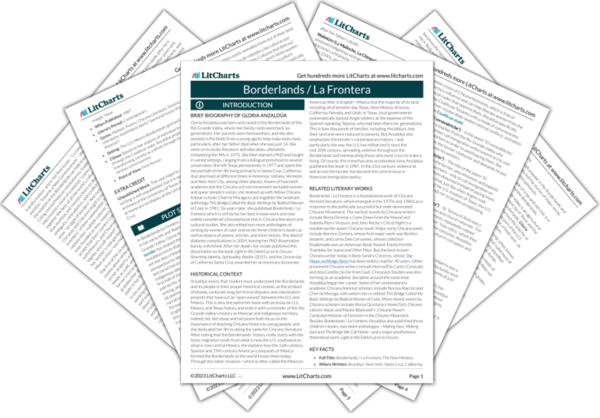Borderlands / La Frontera isn’t just about the psychological and spiritual dimensions of identity: it is also distinctly historical. Gloria Anzaldúa grounds her analysis in the broad history of US-Mexico relations and the specific fate of the Rio Grande Valley, her home, which has always been native land and which the US stole from Mexico in the 1840s. She explains how the US government never honored its treaties promising the land to the 100,000 Tejanos who were living there. In fact, just the opposite happened: state institutions helped white settlers take Tejano land—including Anzaldúa’s family’s—under flimsy pretenses and without adequate compensation. Reduced to poverty, the Tejanos had no choice but to work for a paltry wage in the fields they once owned. Anzaldúa highlights this specific history of dispossession in order to emphasize that the inequalities of the Borderlands are not natural, random, inevitable, or new. Rather, they are the product of a white supremacist policy of stealing wealth, power, and land from people of color and giving it to white settlers. White America has effectively forgotten this history—and hasn’t sufficiently apologized or worked to undo its damage—but Anzaldúa sees reckoning with it as a first crucial step towards dialogue and reconciliation.
History and the U.S.-Mexico Relationship ThemeTracker

History and the U.S.-Mexico Relationship Quotes in Borderlands / La Frontera
The U.S.-Mexican border es una herida abierta where the Third World grates against the first and bleeds. And before a scab forms it hemorrhages again, the lifeblood of two worlds merging to form a third country—a border culture. Borders are set up to define the places that are safe and unsafe, to distinguish us from them. A border is a dividing line, a narrow strip along a steep edge. A borderland is a vague and undetermined place created by the emotional residue of an unnatural boundary. It is in a constant state of transition. The prohibited and forbidden are its inhabitants.
We have a tradition of migration, a tradition of long walks. Today we are witnessing la migración de los pueblos mexicanos, the return odyssey to the historical/mythological Aztlán. This time, the traffic is from south to north.
So, don’t give me your tenets and your laws. Don’t give me your lukewarm gods. What I want is an accounting with all three cultures—white, Mexican, Indian. I want the freedom to carve and chisel my own face, to staunch the bleeding with ashes, to fashion my own gods out of my entrails. And if going home is denied me then I will have to stand and claim my space, making a new culture—una cultura mestiza —with my own lumber, my own bricks and mortar and my own feminist architecture.
Snakes, víboras: since that day I’ve sought and shunned them. Always when they cross my path, fear and elation flood my body. I know things older than Freud, older than gender. She—that’s how I think of la Víbora, Snake Woman. Like the ancient Olmecs, I know Earth is a coiled Serpent. Forty years it’s taken me to enter into the Serpent, to acknowledge that I have a body, that I am a body and to assimilate the animal body, the animal soul.
Because we are a complex, heterogeneous people, we speak many languages. Some of the languages we speak are:
1. Standard English
2. Working class and slang English
3. Standard Spanish
4. Standard Mexican Spanish
5. North Mexican Spanish dialect
6. Chicano Spanish (Texas, New Mexico, Arizona and California have regional variations)
7. Tex-Mex
8. Pachuco (called caló)
This land was Mexican once
was Indian always
and is.
And will be again.
Sí, se me hace que en unos cuantos años o siglos
la Raza se levantará, lengua intacta
cargando lo mejor de todas las culturas.
Esa víbora dormida, la rebeldía, saltará.
Como cuero viejo caerá la esclavitud
de obedecer, de callar, de aceptar.
Como víbora relampagueando nos moveremos, mujercita.
¡Ya verás!
[…]
Yes, in a few years or centuries
la Raza will rise up, tongue intact
carrying the best of all the cultures.
That sleeping serpent,
rebellion—(r)evolution, will spring up.
Like old skin will fall the slave ways of
obedience, acceptance, silence.
Like serpent lightning we’ll move, little woman.
You’ll see.











